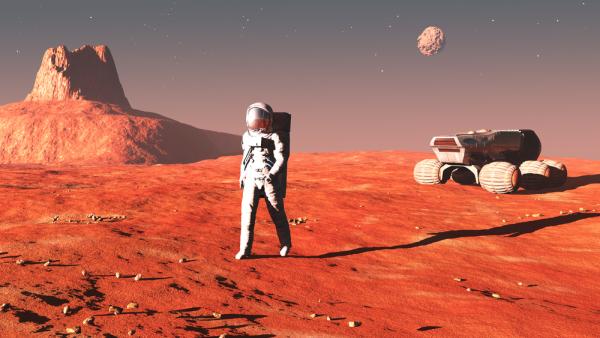Hello, everyone, citizens of Planet Earth? Can we have your attention? Just a moment of your time, please, if you don't mind. By a show of hands, please indicate whether you're dedicated enough and passionate enough ... to travel to Mars.
Yes, Mars.
Now before you do, first please consider some of the following requirements and conditions:
- This isn't a Moon quickie; the trip will take roughly six months
- The chances of dying en route are pretty high
- If we can figure out how to get you there, you will have to figure out how to survive
- Oh, and we have no plans to bring you back to Earth ... Ever.
OK, now, let's see those hands. Hmmm... Interesting. Very promising, in fact.
Alright, you 202,586 folks please fill out this online questionnaire, and we'll be back to you soon.
Thanks!
When you get right down to it, that's basically what happened at the beginning of this decade, during the developmental stages of an audacious plan by innovator Elon Musk to colonize the Red Planet. Subsequently, the candidate pool for the trip, called Mars One, has been winnowed to just 100 applicants. And not surprisingly, the conversation now includes deciding who's qualified to go, or basically, who has The Right Stuff: Mars Edition.
Musk, the CEO of SpaceX, a private company that "designs, manufactures and launches advanced rockets and spacecraft," returned to the interstellar podium late last month to update us all on how the plan is going -- and which of our gung-ho Earthlings are most likely going to be chosen for the far-flung mission.
"We're trying to make it such that anyone can go,” Musk said, as reported by The Verge, a tech website that's partnered with Vox Media, with "maybe a few days of training.” But pulling no punches, Musk added, “The risk of fatality will be really high. There’s no way around it," if the proposed first launch occurs around 2026-27. "It would be basically: Are you prepared to die? If that's okay, then you’re a candidate for going."
Of course, it's more involved that just that. In addition to possessing good physical health, mission management requires Resiliency ("you are at your best when things are at their worst"), Adaptability, Curiosity, Ability to Trust and Creativity/Resourcefulness ("you are flexible in how an issue / problem / situation is approached").
Those skeptical of the mission's chances, who claim it's a woefully underfunded, crazy pipe dream -- "so far the company has raised less than $1 million ... of the $6 billion it estimates it will need" -- wonder aloud how clearing a loose set of behavioral guidelines and providing one's medical and psychological information over the internet could get them into the final 100. One finalist, reportedly a former NASA researcher, even went as far as saying that SpaceX received just 2,700 applications (not 200,000+ as it claimed) and that the entire enterprise was a scam lacking in rigor, as a way to raise money.
OK, that said, who are the so-called Mars 100? To give you an idea, here's a quick snapshot of the group:
- 50 are men, 50 are women
- age range: 21 to 62
- majority (39) come from the Americas
- 31 are European residents
- all but 3 communicate in English

There are at least three 21-year old females: Shradha from India, Robin from Norway and Teah from Australia. On the other end the age spectrum is a Pakistani named Reginald (who, mind you, will be at least 72 if he gets the call to blast off a decade from now).
"There is not an upper age limit to apply for the astronaut selection program," a statement from the Mars One website reads. "If the applicant enjoys good health and he or she has all the other characteristics needed for the mission he or she has what it takes to apply."
Throwing a wide net. Ok, very well.
Undoubtedly, critics could raise questions until the return of Halley's Comet challenging the feasibility of a mission this outrageous and fantastical. Many are doing just that, and as far as scientific endeavors go, that's wholly necessary and warranted. And while there appears to be as many unanswered questions to the Mars One mission as stars in the sky, one thing, on the other hand, seems certain.
Every one of the 100 finalists share the same bold characteristic: Willful self-sacrifice.
All great explorations have to begin somewhere, these gutsy volunteers cite as a reason to enlist. Someone has to be the first to go, they say, and has to be prepared to die to advance the causes and continuation of human civilization.
And if nothing else, you've got to tip your space helmet to that.




